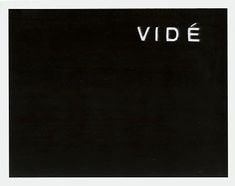Theresa Hak Kyung Cha
Theresa Hak Kyung Cha was born in Korea in 1951 and emigrated to the United States with her family at the age of 13. Raised in San Francisco, she studied art and comparative literature at the University of California at Berkely from the late 1960s to the late 1970s, and film theory at the Centre d'Etudes Américain in Paris. She then returned initially to San Francisco, which at the time was a center of experimental performance and video art. Although the San Francisco Museum of Art invited Cha to present one of her works as early as 1981, it is only in the last decade that her work has received increasing recognition, including retrospectives at the Berkley Art Museum and the Generali Foundation, Vienna. The artist tragically fell victim to an act of violence in New York City in 1982 at the age of only 30.
Shaped by the experience of migration, Cha was occupied with themes such as cultural and linguistic dislocation, alienation, and memory. Her performances, film and video installations, paper and textile works, as well as writings bear witness to her conceptual and poetic confrontation with language, which she considered the most important base of her work. Her comprehensive, intellectual education manifested itself in the attempt to realize structuralist language theory and French film theory through art. In Apparatus, Cinematographic Apparatus, an anthology that she edited in the 1980s, for example, she published one of her own text pieces, Commentaire. Cha’s thoughts are characterized by her special interest in beholders, with whom she wanted to enter into a conversation in her works, allowing them to participate in the production of meaning. Cha, who spoke Korean, English, and French, commonly worked in several languages simultaneously. Her works deconstruct language, literally dismantling words into small parts and in doing so, finding other meanings and new relationships between them, or combining them to new creations—often beyond the borders of languages. Her works aspire to opening thought. Cha sounds out the meaning of language in the formation of identity: she makes being foreign, the threatened loss of self of the subject, tangible in a new language and investigates memory composed in language with regard to its identity-fostering dimension, for example, in Dictee, her most well-known literary work. In this artist’s book, which presents the apex of her work’s dense cultural references, she links her own fate as migrant to the fates of other Korean, European, and American women.
read more read less
